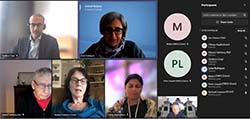On September 27, 2022, GW’s Environmental and Energy Management Institute was awarded a grant from the Secretariat of the United Nations Framework Convention on Climate Change (UNFCCC) to develop a guide for participants in UNFCCC climate change processes. The project includes preparing three asynchronous web-based courses providing an orientation to compliance and implementation requirements under the Paris Agreement as well as background on law and governance foundations underlying the UNFCCC and the Kyoto Protocol.
The team includes Dr. Mukes Kapilashrami, SEAS (Technical Coordinator); Dr. Ed Saltzberg, SEAS (Advisor); Dr. Peter Linquiti, CCAS (Advisor); Dr. Rachael Jonassen, SEAS (Advisor); and Dr. Jonathan Deason (Principal Investigator).
The intense project involves working with UNFCCC staff and the eLearning developer to characterize the audience for the courses identifying the demographics and demographic differences, and the kinds of challenges learners may face in taking an online course and differentiate how each cohort is accustomed to learning. The learning framework will enhance the user experience through instructor engagement, case studies, instructor-mentors, student collaborative learning, independent study, curriculum enrichment library, and similar approaches.
The EEMI team, in conjunction with UNFCCC personnel, is establishing learning outcomes, determining how engagement will be measured, and defining measures of success using metrics such as page views, time online, learner progress rates, and design quizzes (multiple choice to reduce administrative time) to measure knowledge at completion, and certificates of completion.
The EEMI team also is developing means to conduct program evaluation, including analytics and learner feedback through surveys, and develop the educational framework to define the course outline and subtopics, as well as storyboarding the courses by mocking up each subtopic is an effective approach that integrates text, images, videos, and color schemes to ensure that content vision and design are well organized as the outlining process proceeds.
Additional work includes preparing on-line quizzes, group discussion boards, and problem-solving challenges, and development of a pedagogical framework that is built on this philosophy. Many variables will come into play as such frameworks are developed for each of the three courses.


